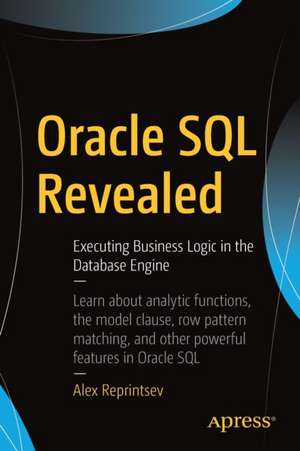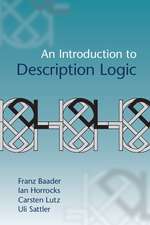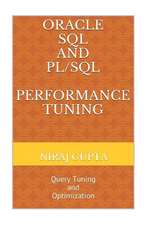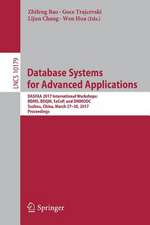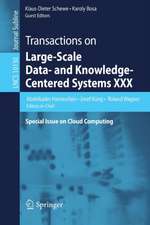Oracle SQL Revealed: Executing Business Logic in the Database Engine
Autor Alex Reprintseven Limba Engleză Paperback – 10 apr 2018
Write queries using little-known, but powerful, SQL features implemented in Oracle's database engine. You will be able to take advantage of Oracle’s power in implementing business logic, thereby maximizing return from your company’s investment in Oracle Database products.
Important features and aspects of SQL covered in this book include the model clause, row pattern matching, analytic and aggregate functions, and recursive subquery factoring, just to name a few. The focus is on implementing business logic in pure SQL, with a comparison of different approaches that can be used to write SELECT statements to return results that drive good decision making and competitive action in the marketplace.
This book covers features that are often not well known, and sometimes not implemented in competing products. Chapters on query transformation and logical execution order provide a grasp of the big picture in which the individual SQL features described in the other chapters are executed. Also included are a discussion on when to use the procedural capabilities from PL/SQL, and a series of examples showing different mixes of SQL features being applied in common types of queries that you are likely to encounter.
What You Will Learn
- Gain competitive advantage from Oracle SQL
- Know when to step up to PL/SQL versus staying in SQL
- Become familiar with query transformations and join mechanics
- Apply the model clause and analytic functions to business intelligence queries
- Make use of features that are specific to Oracle Database, such as row pattern matching
- Understand the pros and cons of different SQL approaches to solving common query tasks
- Traverse hierarchies using CONNECT BY and recursive subquery factoring
Who This Book Is For
Database programmers withsome Oracle Database experience. The book is also for SQL developers who are moving to the Oracle Database platform or want to learn unique features of its query engine. Both audiences will learn to apply the full power of Oracle’s own SQL dialect to commonly encountered types of business questions and query challenges.
Preț: 143.20 lei
Preț vechi: 178.99 lei
-20% Nou
Puncte Express: 215
Preț estimativ în valută:
27.40€ • 28.51$ • 22.62£
27.40€ • 28.51$ • 22.62£
Carte disponibilă
Livrare economică 24 martie-07 aprilie
Preluare comenzi: 021 569.72.76
Specificații
ISBN-13: 9781484233719
ISBN-10: 1484233719
Pagini: 240
Ilustrații: X, 389 p. 4 illus.
Dimensiuni: 155 x 235 x 27 mm
Greutate: 0.56 kg
Ediția:1st ed.
Editura: Apress
Colecția Apress
Locul publicării:Berkeley, CA, United States
ISBN-10: 1484233719
Pagini: 240
Ilustrații: X, 389 p. 4 illus.
Dimensiuni: 155 x 235 x 27 mm
Greutate: 0.56 kg
Ediția:1st ed.
Editura: Apress
Colecția Apress
Locul publicării:Berkeley, CA, United States
Cuprins
Part I: Features and Theory.- .- 1. Joins.- 2. Query Transformations.- 3. Analytic Functions.- 4. Aggregate Functions.- 5. Hierarchical Queries: CONNECT BY.- 6. Recursive Subquery Factoring.- 7. Model.- 8. Row Pattern Matching: match_recognize.- 9. Logical Execution Order of Query Clauses.- 10. Turing Completeness.- .- Part II: PL/SQL and Patterns.- 11. When PL/SQL is Better.- 12. Solving SQL Quizzes.- Appendix A: Useful Oracle Links.
Notă biografică
Alex Reprintsev has more than 10 years of experience in database development using various databases, including Oracle, Microsoft SQL Server, MySQL, DB2, and modern SQL engines for Big Data such as Hive and Impala. He has successfully delivered applications for various customers covering different workload types such as OLTP, OLAP, and mixed workloads. During his journey, Alex has faced a number of challenges related to implementing business logic and tuning SQL for performance. He believes details really do matter, and that it is important to know and exploit the full feature set of whatever database engine you choose to build your business around.
Textul de pe ultima copertă
Write queries using little-known, but powerful, SQL features implemented in Oracle's database engine. You will be able to take advantage of Oracle’s power in implementing business logic, thereby maximizing return from your company’s investment in Oracle Database products.
Important features and aspects of SQL covered in this book include the model clause, row pattern matching, analytic and aggregate functions, and recursive subquery factoring, just to name a few. The focus is on implementing business logic in pure SQL, with a comparison of different approaches that can be used to write SELECT statements to return results that drive good decision making and competitive action in the marketplace.
This book covers features that are often not well known, and sometimes not implemented in competing products. Chapters on query transformation and logical execution order provide a grasp of the big picture in which the individual SQL features described in the other chapters are executed. Also included are a discussion on when to use the procedural capabilities from PL/SQL, and a series of examples showing different mixes of SQL features being applied in common types of queries that you are likely to encounter.
What You Will Learn:
- Gain competitive advantage from Oracle SQL
- Know when to step up to PL/SQL versus staying in SQL
- Become familiar with query transformations and join mechanics
- Apply the model clause and analytic functions to business intelligence queries
- Make use of features that are specific to Oracle Database, such as row pattern matching
- Understand the pros and cons of different SQL approaches to solving common query tasks
- Traverse hierarchies using CONNECT BY and recursive subquery factoring
Caracteristici
Guides you in using analytic functions, the model clause, row pattern matching, and other powerful features in Oracle SQL Helps you find competitive advantage through built-in features that are commonly overlooked Assists you in choosing when to take a procedural approach in PL/SQL Provides examples showing the power of Oracle SQL applied to real-life tasks Presents in-depth analysis of joins, which is one of the most important SQL features
